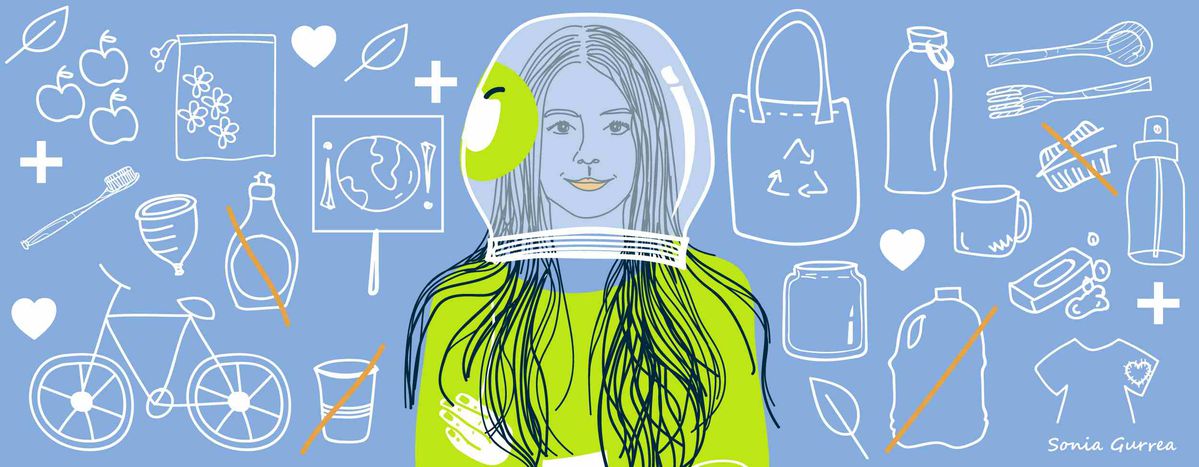
Zero waste: On top form?
Published on
Translation by:
Michelle DemaraisBeing a real social issue, the zero waste lifestyle is gradually spreading worldwide. The idea? Produce less waste while fighting over-consumption. Besides benefiting the environment, going this way could also be righteously good for your health.
It was 7:30 in the evening when about thirty people entered the premises of the imposing international house, a small copy of the Fontainebleau castle and central building of Cité internationale de Paris. At the end of the hallway, a signpost could be seen with "Introduction to Zero waste" on it, organised by Zéro Waste France's Parisian agency, an association fighting for environment preservation. One of the main topics of the agenda, was benefits of a Zero Waste lifestyle on your health and the environment. Four white pillars bordered the rows of red chairs intended for the audience. The spacious hall with old wooden walls had a distinguished but old-fashioned feeling to it, like a Grand Budapest Hotel.
Throw less away, live better
“The best sort of waste is one that is not produced”. Two volunteer speakers, David and Mélusine say setting the tone. In order to raise awareness in the public eye about ecology, the duo lined up some astonishing figures and say “325 million tonnes of waste were produced in 2015 and in 2014, the cost of waste treatment reached 17 billion euros". Words that didn't seem to surprise the already converted audience. “I've replaced all my cleaning products with vinegar” ,says Lucile, a 28 year old occupational therapist. Her statement came over as a familiar record. I wondered how many people around me try to make their own household products, deodorant or jars at home? More and more, according to Zero Waste, who claim that more than 400 towns are involved in the European network and ensure us that hordes of citizens are now signing up for a life with no packaging. People who are concerned about food waste issues as well as their health. Because not only is it environmentally friendly, this initiative would also enable us to live better and longer.
In the student hall, Mélusine and David didn't spend much time on health issues. Right from the very beginning of the movement that only really started a few years ago, the food waste issue still takes up all the room. And yet, the two issues are so connected that you can't really separate them from each other. “Refusing packaged products leads you into buying healthier food.” The words didn't seem to get much reaction but came from a book, considered to be one of the most relevant breviaries on the matter. Simply entitled Zero-waste, Béa Johnson's book has quickly become a best-seller, translated in more than 40 countries, where people are attracted to the combination of food waste issues and feeling good. From California where she has been living for 20 years, the young French woman from Avignon explains to me in a simple manner, “When you buy in bulk (presented in recyclable materials, editor's note) you eliminate packaged and further processed products. Automatically, your food, based on simple and whole foods, becomes healthier". Since she has converted to zero-waste, Béa Johnson constantly travels with a bar soap, a vacuum flask and a cloth bag. Her philosophy is composed of five guidelines, "Refuse what is useless, reduce what is necessary, reuse what you buy, recycle what you couldn't refuse and compost the rest". And when she's in a conference, she often repeats the same story saying she feels better. “My husband used to have chronic sinusitis and myself conjunctivitis due to mascara. Nothing ever since we've been into zero-waste.”
Getting all wrapped up about non-packaging?
Can this hygienic conversion be taken seriously? For the moment, health authorities are taking zero risks in displaying the benefits of zero-waste. However, a few doctors are opening up. Such as Alain Collomb, general practitioner and president of the Provence health and environment association branch. On the phone, he clearly explains to me that waste such as plastic and oil leave volatile organic compounds in the atmosphere. “Basically reducing them would allow us to breathe better. Certain types of plastic release Paraben (preservatives that are added to cosmetics, food or medication, editor's note) that are known to be carcinogenic. Known as endocrine disruptors that are very harmful to health" pursues Alain Collomb. Even if he doesn't really believe in Zero Waste utopia, the practitioner would like to underline the importance of consuming recyclable products that don't remain in the atmosphere and in soils.
So what must be done? Since the idea came out in the 2,000s, many have been following the Zero Waste movement, tempted by a sensible lifestyle. Although most people don't know it yet, the ideas to introduce its use in everyday life are multiplying. Like the Zero Waste Family project that challenges families with goals to reach on a daily basis. Around me, it's in the Rue du Paradis where basics of this utopic lifestyle have taken shape. Since last December, the city hall of Paris has decided to turn this street in the10th district in to a zero waste lab. Coming from public consultation in 2017, they have one year to carry out this experiment adopting new ways of consumption by reducing their waste. A challenge that was initiated as part of Paris's Climate Plan, following the commitments made by Franc at the COP21 conference.
Doctors, restaurants, bars or even big companies represent the different entities in the Paradis Street, as well as its 6,000 residents. A place chosen for the « diversity of its actors, that can reach a wide range of people », explains Loukia Ban, coordinator of Zero Waste Paris. This is a great challenge considering that the district produces 488 kg of rubbish per resident against an average 418 kg per resident in the whole of Paris. "The aim is to change people's behaviour, before even thinking about the garbage issue", says Léa Vasa, Deputy Mayor in charge of the project. For nearly a month now, the politician has been organising meetings with the different actors of the district to set up a zero waste programme. The actions taken only concern food packaging for the moment. "The different offices set up in the district have suggested using food containers for lunch as a zero disposable plan", she continues. Shop owners have also agreed to be part of the programme by getting rid of their disposable consumables. Just like Quentin Jacquemin, manager of La Paroisse, who's gradually removing straws and plastic cups from his bar says,"It's not just about providing technical measures for recycling. It's also about the spirit of sharing and mutual help, a bit like in a village". Who knows if the residents in the 10th district will live longer than others. Besides, no one is going overboard about it, but many locals already seem to be enjoying the plastic-free lifestyle. "Apparently, there will be smart rubbish bins in the street!”, says Quentin enthusiastically. The question remains whether we will all follow Rue du Paradi’s example.
Illustration : © Sonia Gurrea

This article is part of a partnership with Mutualité Française about healthcare issues in Europe. The series is called Cheers. The idea? To discuss social healthcare in an engaging and interesting manner with young people in Europe.
Translated from Zéro déchet : à fond la forme ?



